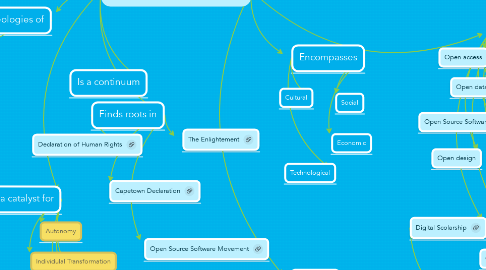Openness in Education
by Ryan WIng

1. Is grounded in the Ideologies of
1.1. Universal Access
2. Advocates
3. Finds roots in
4. Universal Access
5. Self Actualization
6. Inclusivity
7. Equity
8. Human Rights
9. Is a catalyst for
10. Autonomy
11. Social Progress
12. Individulal Transformation
13. Freedom
14. Knowledge for all
15. Knowledge is free
16. Closing digital divide
17. Collaboration
18. Transculturality
19. Transdisiplinarity
20. Is essential to
21. Building peace
22. Sustainable development
23. Intercultural dialogue
24. Declaration of Human Rights
25. Open Source Software Movement
26. Is enabled by
27. Interoperability
28. Tranpsarency
29. Technology
30. Connectivity
31. Attitudes
32. Collaboration
33. Shift from closed to open
34. Culture of sharing
35. Tools
36. Cooperation
37. Capacity
38. Proficiency
39. Access
40. Is a continuum
41. Capetown Declaration
42. Trends
43. Undergoes metamorphosis
44. Which is exemplified by
45. Differentiation
46. Radical Personaliztion
47. Localization
48. Diversification
49. Lifelong Learning
50. Borderless Learning
51. Credentials
52. Certificates
53. Mastery
54. Multiple Pathways
55. Analytics
56. Rich Data
57. Self-organization
58. Personal Ownership
59. Blended Environments
60. Blurring of boundaries
61. Tribing (Wiley, 2006)
62. Extensively Hybridization
63. Global Degrees
64. Multidisciplinarity
65. Anywhere, Any Time
66. Change and Innovation
67. Empowerment
68. Leadership
69. Key Influencers
70. Cultural Shift
71. Disruptive
72. Revolutionary
73. Evolutionary
74. Global
75. Impact
76. Recalibration
77. What Can I Do?
78. Democratization
79. Which leads to
80. Which can be
81. And requires
82. Courage
83. Committment
84. Individual Actions
85. Collective Actions
86. That include
87. Early Adopters
88. Is exemplified by
89. Which include
90. Which looks like
91. Knowledege for all
92. Knowledge construction for all
93. And transforms to
94. Stepping outside your comfort zone
95. Taking chances
96. Is an umbrella for
97. Technological
98. Social
99. Cultural
100. Economic
101. OER
102. Open access
103. Open data
104. Open Source Software
105. Open source hardware
106. Open content
107. Open standards
108. Open design
109. OEP
110. Digital assets
111. Information objects
112. Learning objects
113. Learning activities
114. Learning resources
115. Which reside in
116. Public domain
117. Creative Commons
118. Open scholarship
119. Open teaching
120. Facilitates open licensing
121. Public Domain (CCO)
122. Attribution Alone (BY)
123. Attribution + Non-commercial BY-NC
124. Attribution + ShareAlike (BY-SA)
125. Attribution + No-derivatives (BY-ND)
126. Attribution + Non-commercial + ShareAlike (BY-NC-SA)
127. Attribution + Non-commercial + No Derivatives (BY-NC-ND)
128. Retain
129. Resue
130. Revise
131. Remix
132. Redistribute
133. Promotes increased
134. Knowledge dissemination
135. Pace of development
136. Quality of education
137. Creativity
138. Collaborationn
139. Rethinking delivery
140. Social equity
141. The Enlightement
142. Open research
143. Includes
144. Networked activities
145. Google Docs
146. Yammer
147. Dropbox
148. Skype
149. Blackboard
150. Mural.ly
151. Google Hangouts
152. Adobe Connect
153. WordPress
154. Blogger
155. Includes
156. With guiding framework
157. Consideration must be given to
158. OER models include
159. Endowment model
160. Memebership model
161. ROER
162. Challenges faced include
163. Quality assurance
164. Cultural imperialsim
165. Gloablization
166. Discoverability
167. Sustainability
168. Copyright
169. Skills required
170. Donations model
171. Conversion model
172. Contributor-Pay model
173. Sponsorship model
174. Intsitutional model
175. Government model
176. Resource repositories
177. Examples include
178. Khan Academy
179. iTunesU
180. MERLOT II
181. OER Commons
182. OpenStax College
183. Academic Earth
184. Cost
185. Technology
186. Organization
187. Policy
188. 5 OER Permissions
189. Partnerships/Exchanges
190. Open scholar
191. Requires platforms like
192. MOOCS
193. DOCCS
194. Open EdX Stanford Online
195. Coursera
196. Class2Go
197. EDRAAK
198. edX
199. OERu
200. OpenLearn
201. Encompasses
202. External subject communities
203. Whose curation includes models that are
204. Within academia
205. Social curation
206. Social curation
207. Cyber Librarians
208. Public Open Scholar
209. Crowdsourced
210. Curated
211. Disciplinary Expert
212. Discovery
213. Integration
214. Application
215. Teaching
216. Digital Scolarship
217. Pinterest
218. Tumblr
219. Scoop.it
220. Juxtapose
221. Which includes
222. Including
223. With platforms that include
224. Models converge
225. Teachers as curators
226. Digital scholars
227. Through inititiative like
228. Knowledge Creation
229. Cultural dominance


